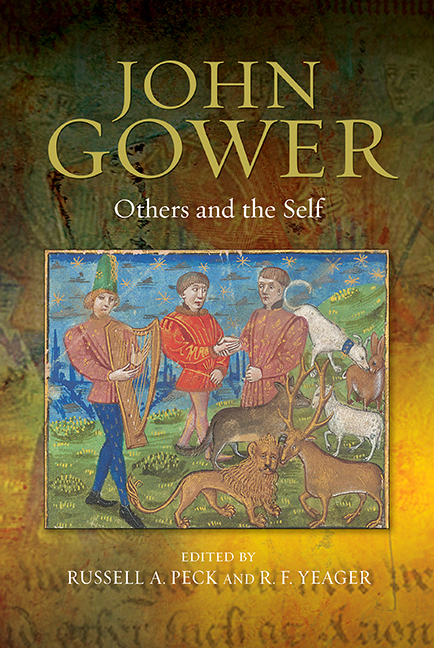Book contents
- Frontmatter
- Contents
- List of Illustrations
- Abbreviations
- Introduction
- PART I KNOWING THE SELF AND OTHERS
- 1 The Materiality of Cognition in Reading, Staging, and Regulation of Brain and Heart Activities in Gower's Confessio Amantis
- 2 The Sound of My Voice: Aurality and Credible Faith in the Vox Clamantis
- 3 “Noght withoute peine”: Chastity, Complaint, and Lucrece's Vox Clamantis
- 4 Reading Faces in Gower and Chaucer
- 5 Gower and Mortality: The Ends of Storytelling
- PART II THE ESSENCE OF STRANGERS
- PART III SOCIAL ETHICS, ETHICAL POETICS
- Bibliography
- Index
- VOLUMES ALREADY PUBLISHED
4 - Reading Faces in Gower and Chaucer
from PART I - KNOWING THE SELF AND OTHERS
Published online by Cambridge University Press: 30 April 2019
- Frontmatter
- Contents
- List of Illustrations
- Abbreviations
- Introduction
- PART I KNOWING THE SELF AND OTHERS
- 1 The Materiality of Cognition in Reading, Staging, and Regulation of Brain and Heart Activities in Gower's Confessio Amantis
- 2 The Sound of My Voice: Aurality and Credible Faith in the Vox Clamantis
- 3 “Noght withoute peine”: Chastity, Complaint, and Lucrece's Vox Clamantis
- 4 Reading Faces in Gower and Chaucer
- 5 Gower and Mortality: The Ends of Storytelling
- PART II THE ESSENCE OF STRANGERS
- PART III SOCIAL ETHICS, ETHICAL POETICS
- Bibliography
- Index
- VOLUMES ALREADY PUBLISHED
Summary
In Book VII of John Gower's Confessio Amantis, between the stories of the pitiless tyrant Spertachus and the timorous ruler in the “Mountain and the Mouse,” Genius voices the astonishing advice that the king should shape his face so as to control what it expresses to others:
A king schal make good visage,
That no man knowe of his corage
Bot al honour and worthinesse.
For if a king schal upon gesse
Withoute verrai cause drede,
He may be lich to that I rede;
And thogh that it be lich a fable,
Th'ensample is good and reasonable.
According to Niccolo Machiavelli's memorable assessment of the relative value of ethical virtue in The Prince, “it is unnecessary for a prince to have all the good qualities I have enumerated, but it is very necessary to appear to have them.” Genius’ pragmatic advice would fit right into Machiavelli's guide to effective rule, but in the context of the Confessio, it is bewildering, for it is difficult—perhaps impossible—to reconcile with Gower's commitment to plainness and transparency, both ethical and referential. Twisty in lexis and syntax, it undermines both the Golden Age ideals of political rule with which the poem begins, and the education in such ethical matters as “trouthe” with which Gower seeks to restore a more ideal form of governance to England. In order to clarify what is so discomfiting about Genius’ advice, this essay will first sketch in the common medieval association of physiognomy—the science of reading faces—with the arts of rule, using one of Gower's chief sources for Book VII, the Secreta Secretorum. The physiognomic thinking that underlies the key contexts in the Prologue and Book VII will then help in teasing out what makes Genius’ advice confounding. Finally, a set of distinctively Gowerian terms interpolated into the Clerk's Tale and its framing will adumbrate Chaucer's response to the advice; by reading backward from this response, we can discern the problems it creates not just for the political renovation the Confessio seeks to bring about, but also for the ethics of the poet himself as an advisor to princes.
- Type
- Chapter
- Information
- John Gower: Others and the Self , pp. 73 - 90Publisher: Boydell & BrewerPrint publication year: 2017

